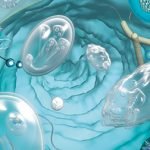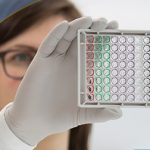RIDA®GENE Helicobacter pylori is a sensitive and specific real-time PCR assay. It simultaneously detects and differentiates Helicobacter pylori and its resistance to clarithromycin in human tissue biopsies. Results are obtained within 1 day whereas the current gold standard method requires 5 days.
Helicobacter pylori (H. pylori) increases the secretion of stomach acid and hence leads to different gastric diseases such as gastritis, duodenal ulcers and gastric cancer.
After diagnosis of H. pylori, different treatment regimens are possible. The standard “triple therapy” consists of two antibiotics, mainly clarithromycin and amoxicillin, and a proton pump inhibitor (PPI). Increasing rates of resistant bacterial isolates lower the success rate by up to 30 %. In cases of treatment failure, culture with determination of the resistance pattern is mandatory.
Detection of Helicobacter pylori and its clarithromycin resistance in one assay – results within 1 day
While culture and determination of the resistance pattern takes a minimum of 5 working days. Results with real-time PCR can be obtained within 1 day.
For more detailed information, the poster which was presented at ECCMID 2016 is available on request.
About the assay
RIDA®GENE Helicobacter pylori is a real-time PCR for the direct, qualitative detection of Helicobacter pylori and its resistance to clarithromycin from human native tissue biopsie material. It is intended for use as an aid in diagnosis of gastric infections caused by H. pylori.
About RIDA®GENE
The R-Biopharm RIDA®GENE kits include all necessary components required for the specific detection of pathogens. An included extraction control ensures reliable results. All R-Biopharm RIDA®GENE kits are CE marked and are regularly evaluated in most common proficiency testing schemes such as QCMD, Instand and UK NEQAS.









